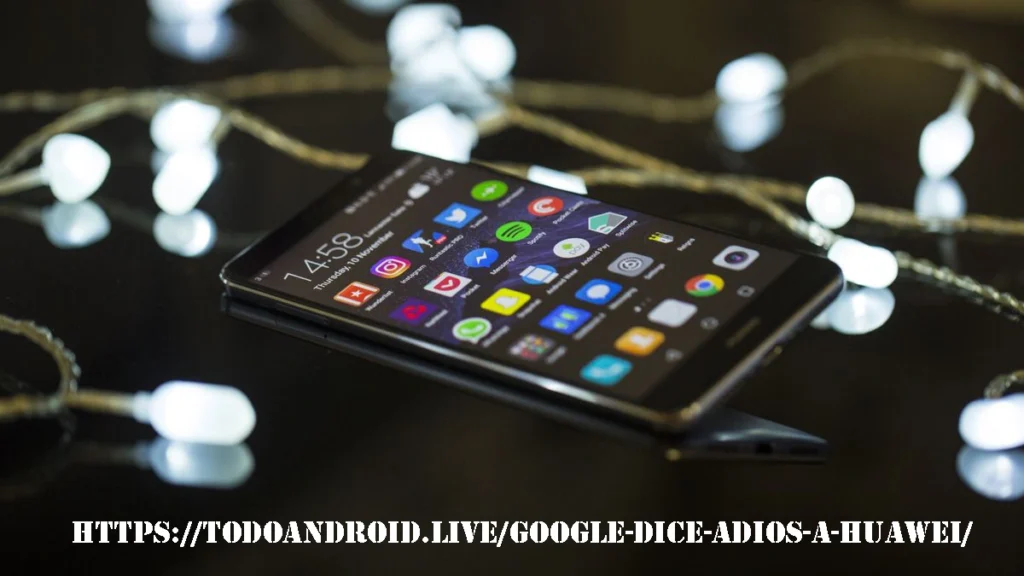Introduction to the Google-Huawei conflict https://todoandroid.live/google-dice-adios-a-huawei
The landscape of the tech world shifted dramatically when news broke about Google’s decision to sever ties with Huawei. This move sent shockwaves through the industry, impacting everything from smartphone functionality to consumer choices. As two giants clashed, many found themselves caught in the middle—Huawei users left wondering about their future and what alternatives exist. The implications stretch beyond just business; they touch on politics, security, and global commerce. Let’s dive into this intricate saga that has changed how we view technology partnerships and what it means for millions around the globe.
https://todoandroid.live/google-dice-adios-a-huawei What led to Google’s decision to cut ties with Huawei?
The decision for Google to sever ties with Huawei stemmed from escalating geopolitical tensions. The U.
S. government raised concerns about national security, citing fears over potential espionage linked to the Chinese tech giant.
In May 2019, Huawei was placed on the Entity List by the Trump administration. This move restricted American companies from doing business with Huawei without special permission.
As a key player in Android’s ecosystem, Google’s choice became clear. The risk of sanctions and penalties outweighed potential benefits. Consequently, this action disrupted access to vital services like Google Play Store and other essential applications for future Huawei devices.
The ripple effects were immediate as consumers began questioning their loyalty to a brand suddenly stripped of its software support.
Impact on Huawei and its customers https://todoandroid.live/google-dice-adios-a-huawei
The fallout from Google’s decision has hit Huawei hard. The ban on access to essential services like the Google Play Store and Gmail has left many users stranded. They can no longer enjoy popular apps that rely on these platforms.
For customers, this means compromised functionality. Many features they once took for granted are now unavailable or limited. Users seeking updates or app support face uncertainty in their day-to-day experiences.
Huawei’s brand loyalty is being tested as consumers weigh their options. Some may consider switching to other brands that offer full access to Google’s ecosystem.
Moreover, Huawei’s reputation in global markets could suffer long-term consequences. Trust is a fragile commodity, particularly when it comes to technology investments.
This complex situation places both the company and its users at a crossroads, forcing them to navigate uncharted waters moving forward.
Alternatives for Huawei users https://todoandroid.live/google-dice-adios-a-huawei
For those affected by the Google-Huawei split, several alternatives exist. Users looking for similar features can explore brands like Samsung and Xiaomi. Both companies offer high-performance devices with robust ecosystems.
Another option is to consider OnePlus smartphones. Known for their speed and clean user interface, they might fill the void left by Huawei devices.
If you’re particularly concerned about software updates, switching to a Pixel device could be wise. Google’s own phones receive timely updates directly from the source.
Alternatively, mid-range options like Motorola or Realme provide good performance at a lower price point without sacrificing quality too much.
Exploring Linux-based operating systems on smartphones may appeal to tech-savvy users seeking privacy-focused solutions. This route requires some technical know-how but offers greater control over your device’s functionality.
Response from Huawei and Chinese government https://todoandroid.live/google-dice-adios-a-huawei
Huawei’s response to the severed ties with Google has been resolute. The company emphasized its commitment to innovation and independence. They announced plans to accelerate the development of their own operating system, HarmonyOS. This strategy aims to reduce reliance on Western technology.
The Chinese government also weighed in on the situation, expressing strong support for Huawei. Officials denounced Google’s actions as politically motivated and detrimental to international trade relations. They highlighted a broader narrative of protecting national interests against foreign interference.
Moreover, Beijing is keen on fostering homegrown technology firms. Investment in research and development has surged as China seeks self-sufficiency in tech sectors previously dominated by Western companies. This conflict could reshape the global tech landscape significantly over time.
Both parties are navigating uncharted waters, signaling an evolution in how technological alliances will be viewed moving forward.
Future implications of this conflict https://todoandroid.live/google-dice-adios-a-huawei
The fallout from the Google-Huawei conflict will likely ripple through the tech industry for years. Companies are now reassessing their relationships with suppliers, particularly regarding security and compliance.
Huawei’s struggle may prompt other manufacturers to diversify their partnerships. This shift could lead to the rise of alternative operating systems and app stores as competition intensifies.
Additionally, consumers might start favoring brands that prioritize data privacy and transparency. As trust becomes a currency in technology, companies may need to invest more in ethical practices.
Governments worldwide are closely monitoring these developments too. Regulatory frameworks could emerge aimed at addressing similar situations, potentially reshaping global trade dynamics.
Increased scrutiny on tech giants is inevitable. This situation has opened a dialogue about sovereignty in technology—a crucial aspect going forward.
Conclusion and final thoughts https://todoandroid.live/google-dice-adios-a-huawei
The fallout from the Google-Huawei conflict offers valuable insights into international business relations and technology dependence. As both companies navigate these turbulent waters, the implications for consumers are significant.
Huawei users face uncertainty as they adapt to a world without Google services. While alternatives exist, transitioning can be challenging. The response from Huawei and Chinese authorities underscores the geopolitical stakes involved in this rivalry.
Looking toward the future, it remains unclear how this situation will evolve. Technology continues to shape our lives rapidly, and conflicts like this one highlight vulnerabilities in global supply chains.
As consumers, staying informed is crucial as developments unfold. Watching how these tech giants adjust their strategies may provide clarity on what lies ahead for both Huawei and its user base.




